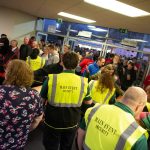Do you want to know what is expected from the role of an SIA operative. Check out below Main Event Security’s expectation.
SIA operatives are to provide a professional service by creating a safe enjoyable experience to visiting members of the public. Main Event Security’s emphasis is always customer safety with our primary objective: all patrons arrive safely, enjoy the day and leave safely.
This is achieved by providing a professional, proactive, courteous approach towards the visiting patrons. Providing and maintaining a safe environment responding to emergency services efficiently and assisting emergency services as required. By operating the company procedures and by maintaining Health & Safety to a high level we achieve our objective.
By understanding the principles and general responsibilities towards the health and safety of all categories of spectators (including those with disabilities and children) work colleagues and yourselves.
Under the private security act, door supervisors must have a licence to practice issued through the security industry authority. It is an offence to work as a door supervisor if you do not have a licence.
Your SIA licence must be worn and be visible at all times whilst you are on duty. It is an offence to work in a security position without a valid SIA licence. If you arrive for duty without your valid licence you will not be able to be deployed in a security position, you may be offered work as a steward or be asked to leave site. It is your responsibility to notify the SIA if you change your address.
By implementing and enforcing the safety management plan efficiently and operating to our core principles you should be able to carry out your duties correctly and with the enthusiasm we operate as a company. Please follow these basic principles;
• Carry out a pre safety check of your area and monitor your working area for any unsafe issues that could cause a problem with your Health and Safety towards members of the public, other staff and yourself (duty of care)
• Assist in directing members of the audience to safe viewing areas b achieving an even flow in and out of the location you are operating.
• To assist in the prevention of breaches of safety and ground or venue regulations.
• To carry out your duties you may need to refuse entry, search, evict or even arrest people
• If you are required to conduct a search you are required to stick to these simple rules:
o You must obtain permission form the person you wish to search
o Male members of staff search males only
o Female members of staff to search females only
o Ask members of the public to open their bags, do not open them yourself, and do not place your hands into pockets or bags feel and look from the outside
• If you have to use force when dealing with an incident, and incident report will need to be filled out, detailing what happened, where the incident took place, the date and time of the incident, if and when the police were called, the people involved and any witnesses, and why the incident happened.
• If a person refuse to be searched, contact your supervisors, we can only search as a condition of entry, if a person refused to be searched you can only deny them access in to the venue.
• Monitor the density levels of the public and recognize any unsafe crowd condition using the square meter rule; remember if more than three people are standing in one square metre over a large area, contact your supervisor.
• Be familiar with your working environment which allows you to direct members of the public efficiently.
• Know the location of: fire points, first aid points, toilet facilities including disables, catering points, public bars, VIP areas, cash machines, public phone points, merchandise points, alarm points, box office, information points, water points, special needs location and emergency services locations. All of these points are critical when helping members of the public visiting your location; a professional personal takes great pride in providing information of the public.
• To cover strategic points (entrance & exit doors) within the location you are working and recognize the importance of these positions.
• Assist in keeping isle ways, stairwells, gangways, stairs and exit doors clear at all times.
• Monitor your area of operation at all times for overcrowding or signs of distress contact your supervisor if you suspect a problem.
• Know how to operate the fire equipment located close to you and its location, this could save lives if required.
• Be fully conversant with methods used to raise the alarm in an emergency and know the location of these points.
• Understand the emergency procedure and the roles you play in its implementation. Make sure you have a copy of the emergency procedure being used every time when you go to work.
• Be capable of recognizing potential fire hazards and suspect packages and know the correct method of reporting these to your supervisor.
• Monitor and report any incident or potential problem including any defect or potential danger to members of the public.
• Comply with any instruction given to you by your supervisor or any request by a member of the emergency services.
• Be familiar with you role in an emergency situation know and understand your routes of evacuation and the routes you will direct members of the public.
• Assist the emergency services if necessary and as required.
• Know the location of your R.V Point, it is important in an emergency situation develops that you report here once you have finished assisting in the emergency situation. Failure to report to the R.V Point will cause unnecessary concern for the supervisor who could send emergency service personnel into your location to find you.
• Know the location of your nearest first aid point.
Ultimately by knowing this information when you are working at any assignment you will be able to conduct your job more efficiently and professionally.



